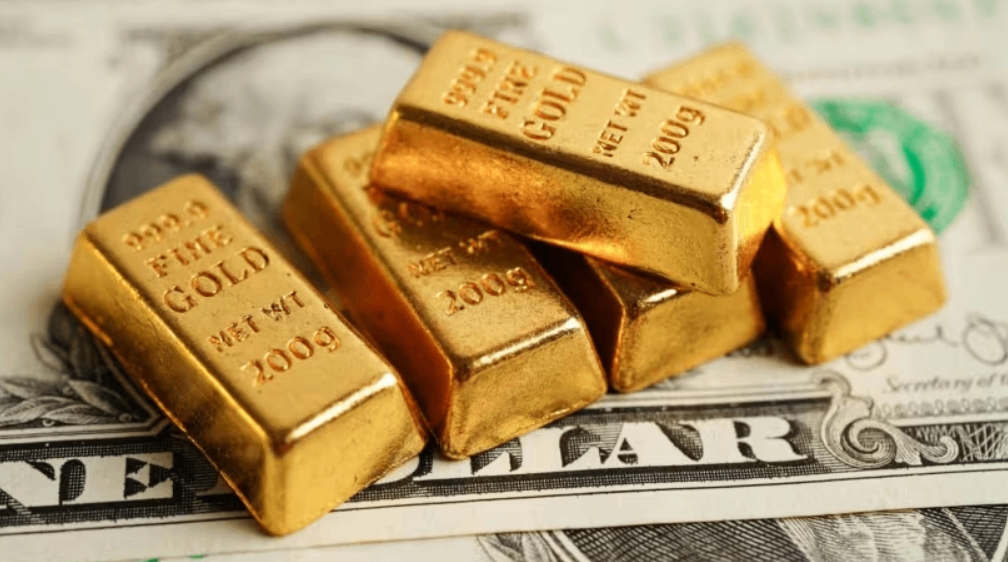International gold safe-haven rises, set to break $2,500
Analysts say gold's strength is related to central bank purchases, strong demand in Asian markets (especially China), and escalating geopolitical tensions in Ukraine and the Middle East.
On May 20, buoyed by the Federal Reserve's dovish sentiment and tensions in the Middle East, gold soared to a historic high.
In early Asian trading on Monday, gold surged 1.4% to $2,450.07 per ounce, surpassing the intraday record set in April. Over the past few trading days, traders have increased their bullish bets on gold as the market believes the Fed may start cutting rates as early as September.
Last week, due to a greater-than-expected slowdown in US April inflation, coupled with weak performances in several US economic data points: the US April Conference Board Leading Economic Index recorded a monthly rate of -0.6%, below the market expectation of -0.3%, with a previous value of -0.3%. The decline in April indicators was driven by deteriorating consumer outlooks on the business environment, reduced new orders, negative yield spreads, and a decline in new building permits.
Influenced by the data, precious metal prices were supported, the US dollar fell, and bond prices rebounded.
On Sunday, a significant event occurred in the Middle East: a helicopter carrying Iranian President Ebrahim Raisi and the country's foreign minister crashed in thick fog, providing buying support for gold's safe-haven properties. Iran's officials have confirmed that Raisi died in the crash.
Over the weekend, a tanker heading towards Asia was struck by missiles fired by Houthi militants, escalating the risk situation in the Red Sea shipping lanes. Meanwhile, escalating tensions between Russia and Ukraine also boosted safe-haven demand, with both countries launching attacks on each other last weekend.
Nicholas Frappell, Global General Manager of the Sydney-based ABC Refinery, said, "The rise in gold is news-driven due to the uncertainty surrounding events in Iran." He added, "With minimal information available, there is inevitably an element of rushing to conclusions," adding, "Given lower liquidity in Asia, investors may be unwilling to lighten their positions."
The latest data from the US Commodity Futures Trading Commission shows that hedge funds raised their bullish bets on gold to the highest level in three weeks in the week ending May 14. These increases suggest that gold and silver have broken out of the relatively narrow trading range of recent weeks amid uncertain US interest rate trends. After experiencing a rapid rise to record highs throughout April, gold and silver prices have risen by nearly 20% this year.
Analysts say gold's strength is related to central bank purchases, strong demand in Asian markets (especially China), and escalating geopolitical tensions in Ukraine and the Middle East.
Economies.com, a well-known investment website, states that after attempting to confirm a breakthrough above $2,431.44 per ounce, this sets the stage for further price increases and reaching new bullish targets. It is expected that gold prices will reach the next major target of $2,500.00 per ounce. We will continue to forecast a bullish trend in gold prices for the foreseeable future. It should be noted that if gold prices fail to hold above $2,431.44 per ounce, this could lead to new bearish adjustments during the day.
Tianhong Fund believes that fundamentally, last week's US economic data helped the market price in expectations for two rate cuts this year, and with strengthened rate cut expectations, gold is expected to continue its upward trend. In the medium to long term, Sino-US trade frictions and the reshoring of manufacturing to the US will boost global inflation; the size of US debt continues to rise, the US restricts countries like Russia using the dollar as a weapon, non-Western countries continue to hoard gold for security reasons, and the current international situation remains confrontational, with risk control demand unabated. Therefore, we maintain our original judgment that gold is a worthwhile asset to allocate over the next 2-3 years.

·Original
Disclaimer: The views in this article are from the original Creator and do not represent the views or position of Hawk Insight. The content of the article is for reference, communication and learning only, and does not constitute investment advice. If it involves copyright issues, please contact us for deletion.